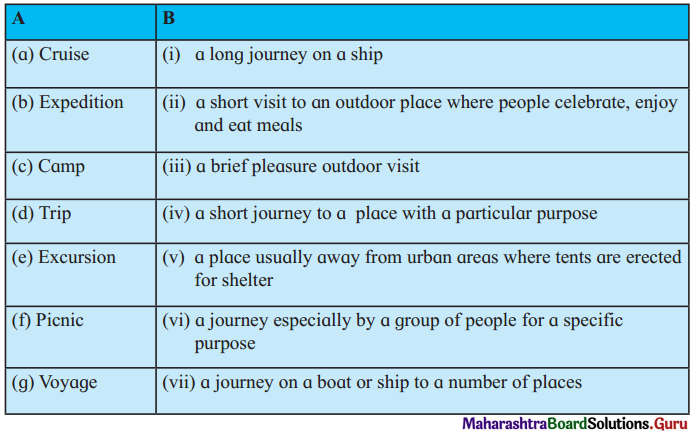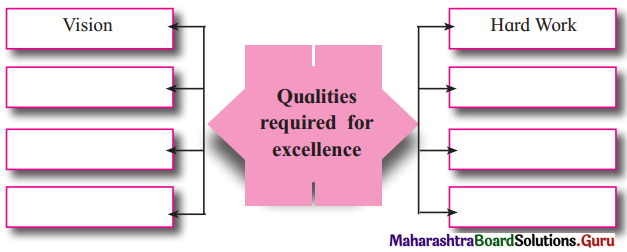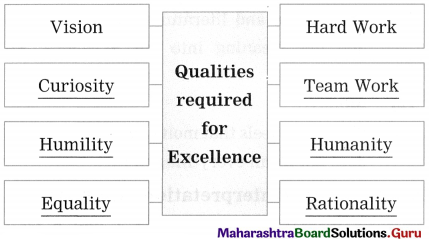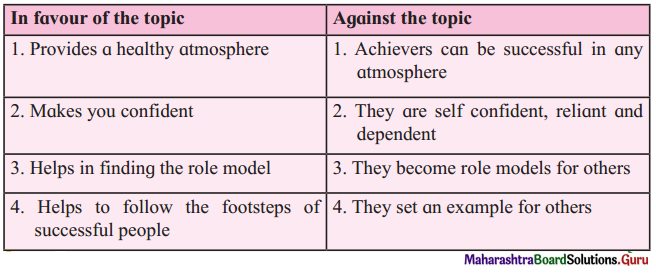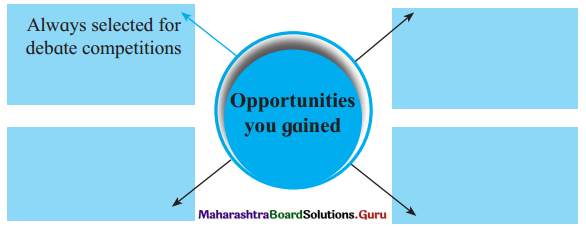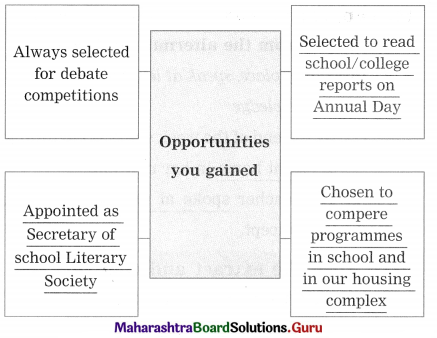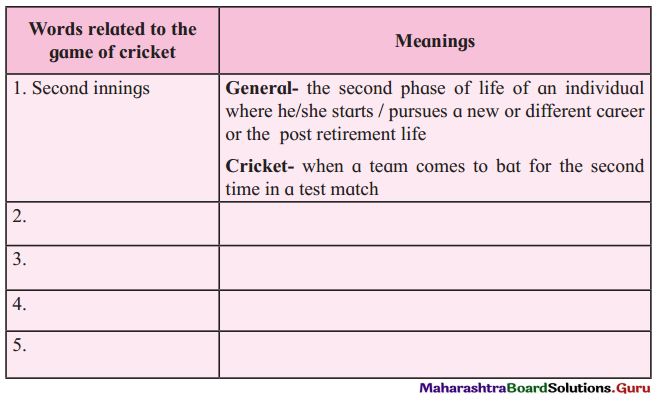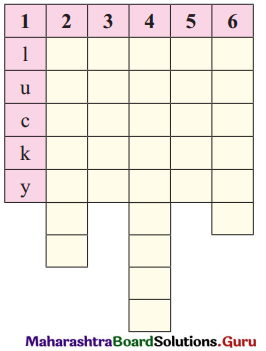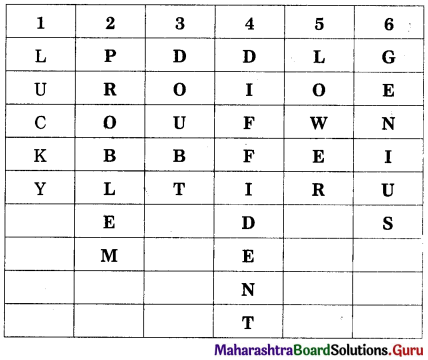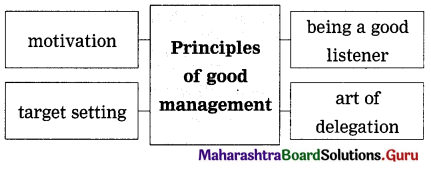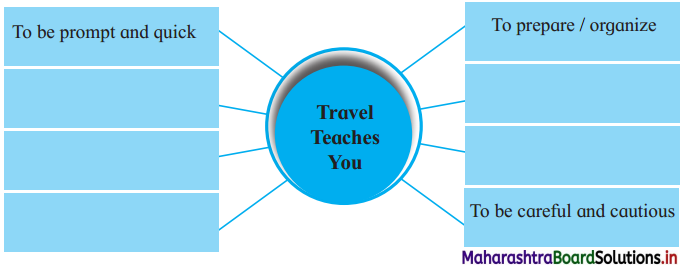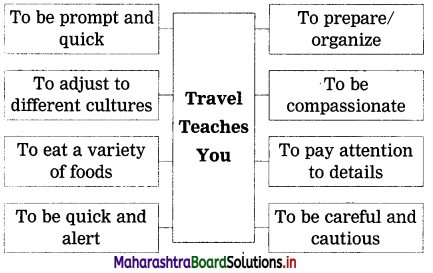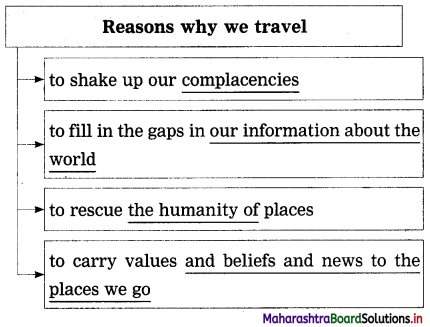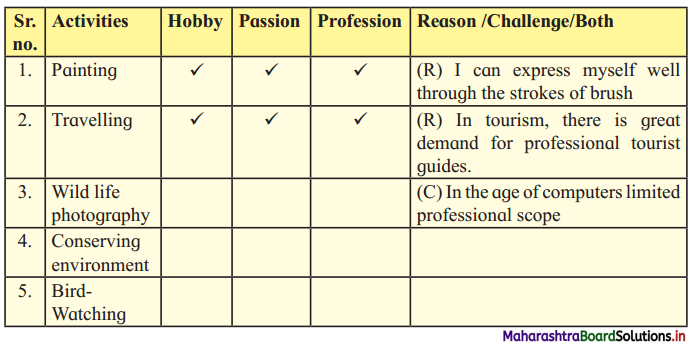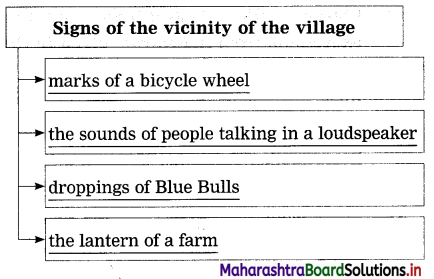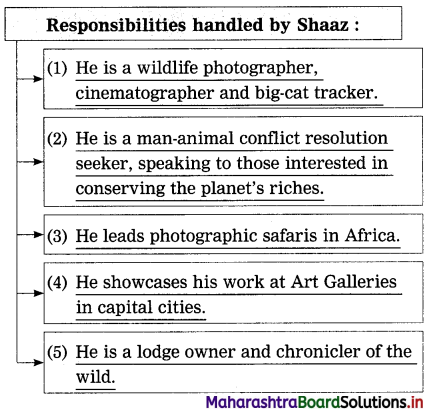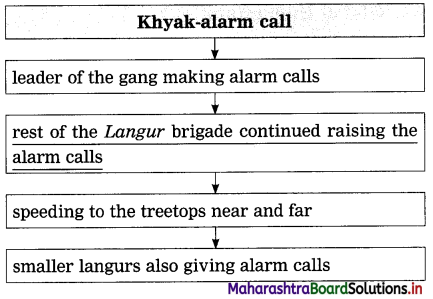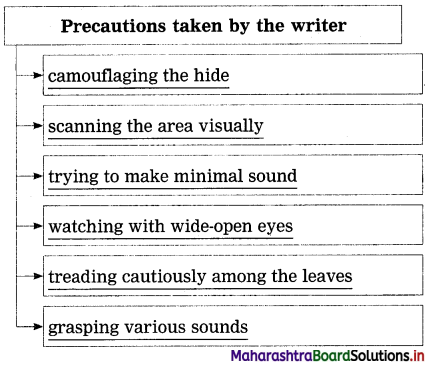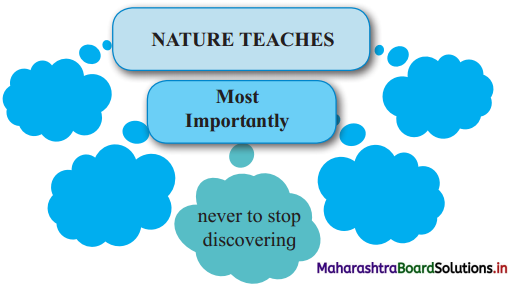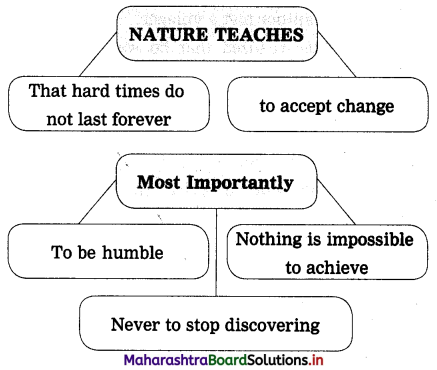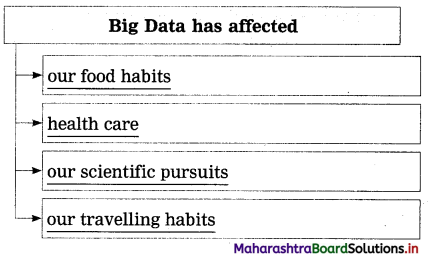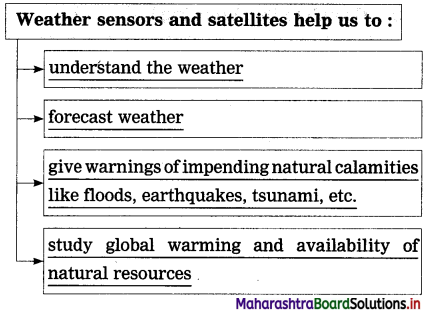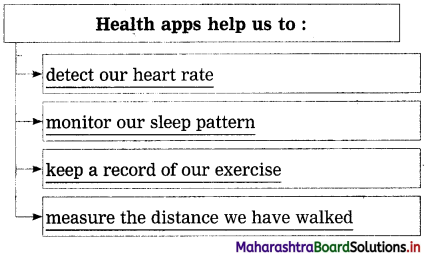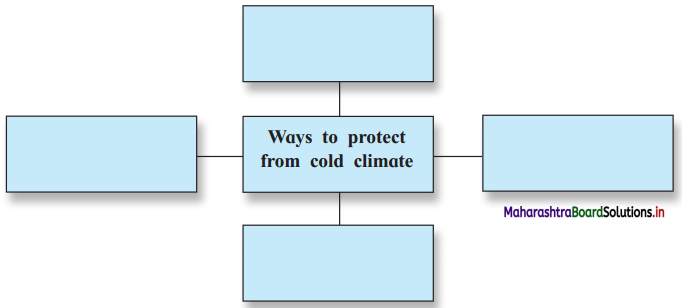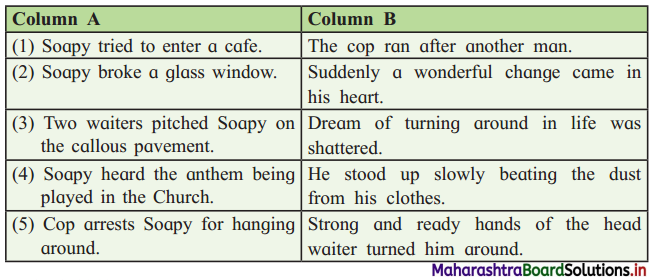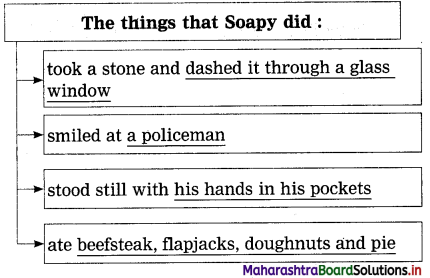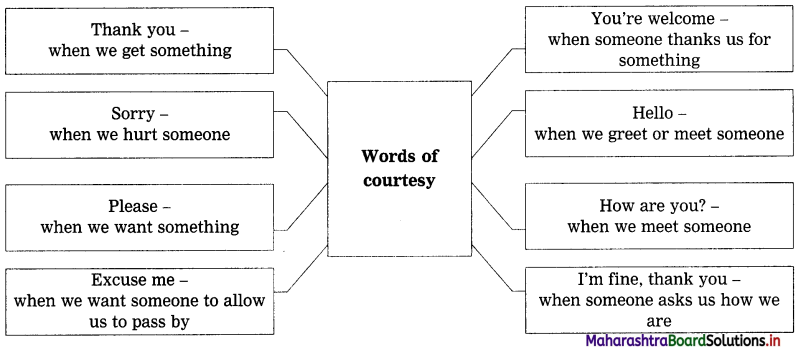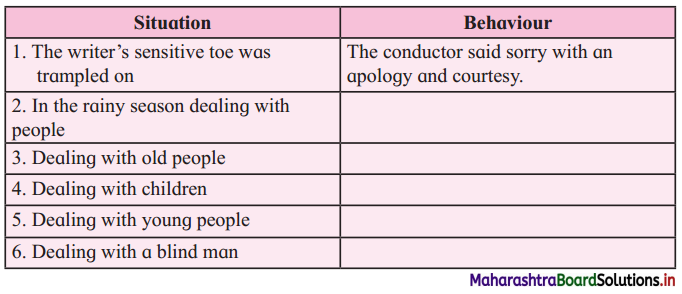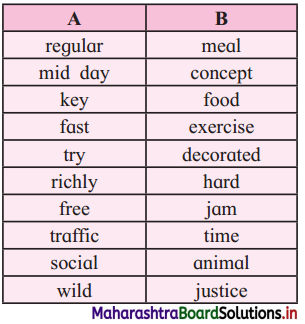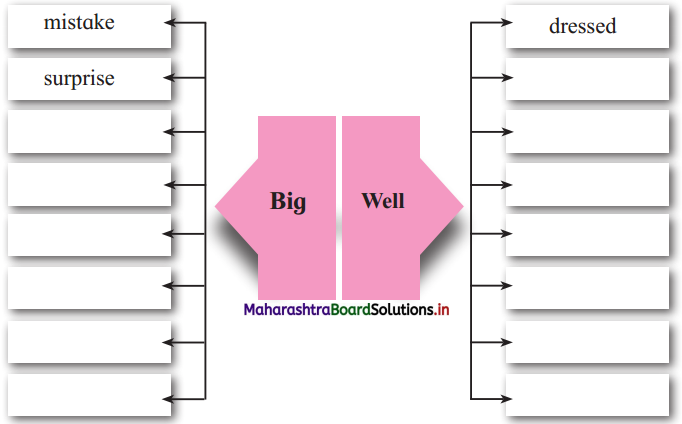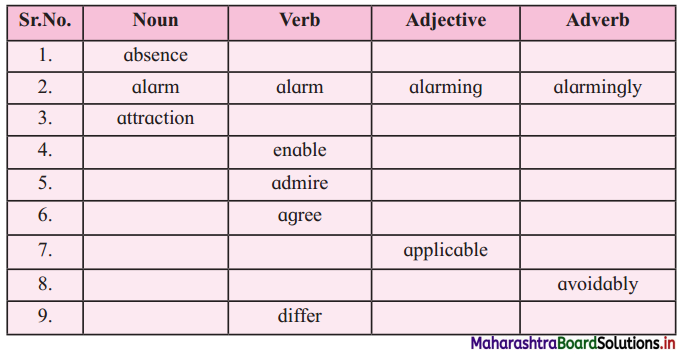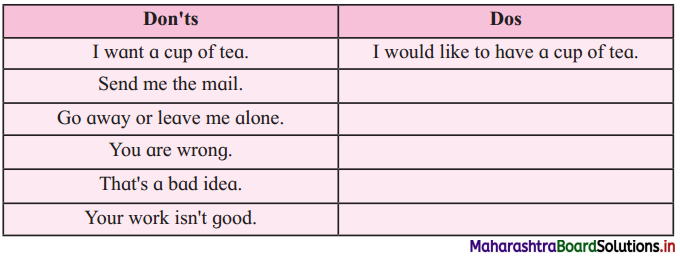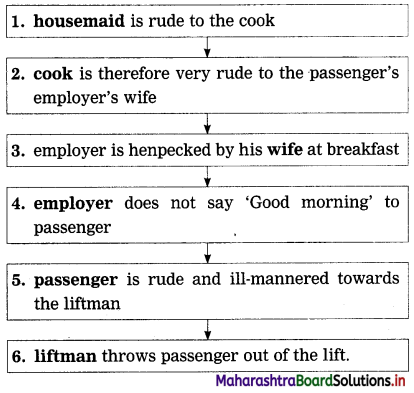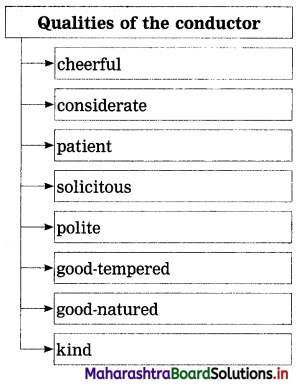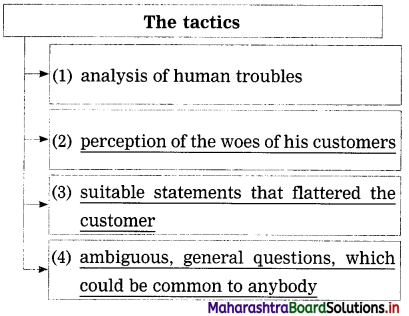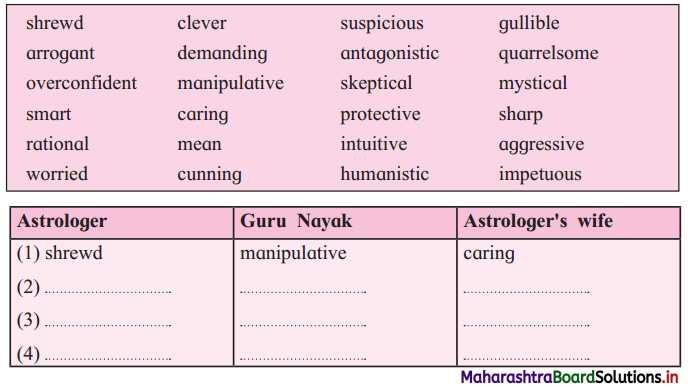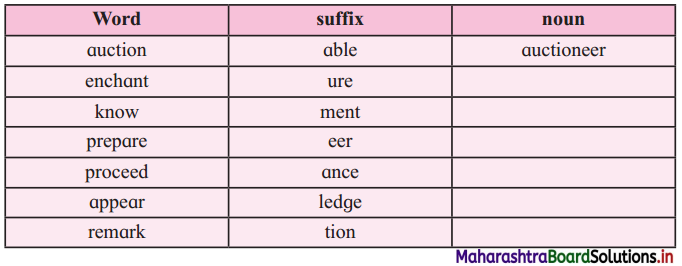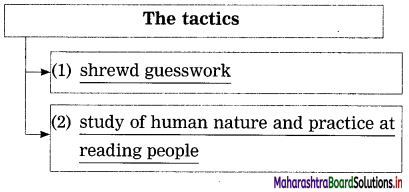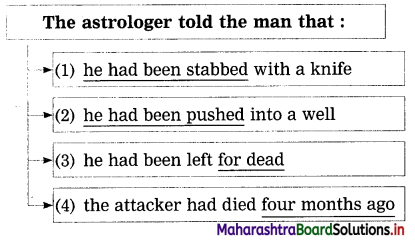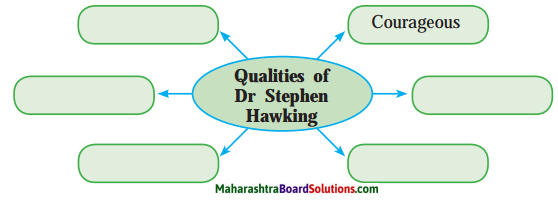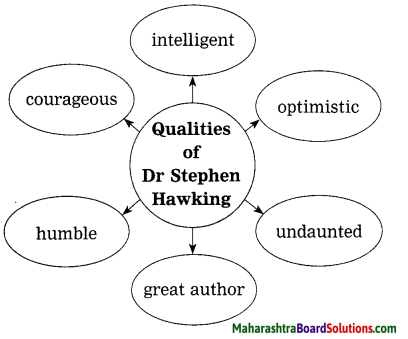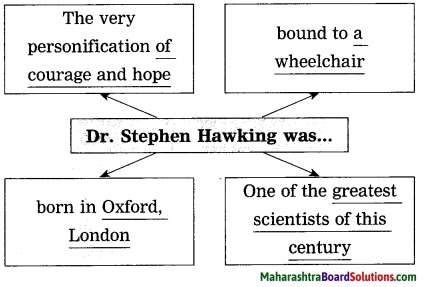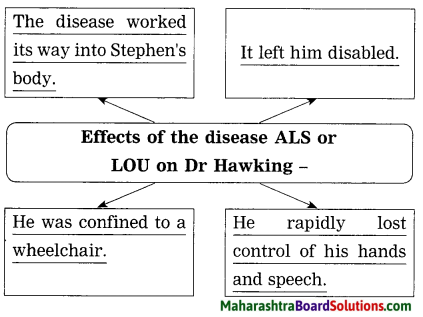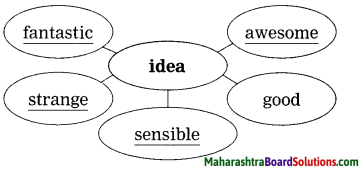Class 12 English Chapter 2.1 Song of the Open Road Question Answer Maharashtra Board
Balbharti Yuvakbharati English 12th Digest Chapter 2.1 Song of the Open Road Notes, Textbook Exercise Important Questions and Answers.
12th Std English Chapter 2.1 Brainstorming Question Answer
12th English Digest Chapter 2.1 Song of the Open Road Textbook Questions and Answers
Question 1.
Choose the mode of travel that you would like the most, for a journey.
(a) Airways
(b) Waterways
(c) Railways
(d) Roadways.
Give reasons for your preference.
Answer:
(a) Airways:
- Time-saving even if costly
- Affordable nowadays due to economy airlines
- Useful to go all over the world if one can afford
- Qan enjoy birds’- eye view of different places
(b) Waterways:
- Enjoyable way to travel
- Commuting on waterways is not common all over India.
- In Kerala people use boats on canals and creeks for daily commute
- Long-distance travel by cruise-ship would offer new experiences on the oceans
- Can experience peace of mind and relaxation on long journey by waterway
(c) Railways:
- safe, quick and cheap way to travel long distances
- convenient for overnight journeys – no extra cost for night stay and rest
- comfortable for individuals, families, large groups
- view of the passing landscape and communities living along the route
- opportunity to meet people and even make new friends
- work, family trips, pilgrimage, touring – all kinds ofjourneys are possible and affordable.
(d) Roadways:
- can travel through remote areas
- travel by own vehicle gives more freedom.
- can enjoy the natural beauty -greenery, mountains, water-bodies
- see various geographical features, flora, and styles of clothing, food and even language.
![]()
Question 2.
Discuss with your partner, the preparations you would like to make for the journey chosen.
Answer:
(a) A journey by road will need a (virtual) map for the route to take. Road trips are unpredictable. Except for highways we do not know where food, water and facilities like restrooms or pharmacy may be available. One has to carry food, drinks and emergency medicines for unexpected situations. Umbrella or other rainwear, flashlight, spare tyre, tool box and jack are a must. Also when travelling by one’s own vehicle we must have the vehicle serviced and in perfect shape for long distance travel.
(b) All documents related to the vehicle – driver’s licence, registration- papers and insurance papers must be updated and ready to be shown. All journeys require the traveller to wear suitable comfortable clothes. So one would have to wear and pack clothes and accessories accordingly. One also has to foresee what weather conditions maybe along the journey and carry suitable items for that.
(c) Since all of us own mobile phones and our family will want to know about our well-being, one must remember to carry the phone charger and even a power- bank if possible. One must carry a list of emergency contact numbers on paper, in case one’s phone is lost or does not work.
(d) If one decides to travel alone one must be in touch with their loved ones daily, at least once at a particular time. If one has company then the travellers should also discuss the budget, schedule, how to tackle emergencies.and also what to do in unexpected situations.
Question 3.
Discuss the ways in which you would overcome the problems/hindrances/ difficulties you face during the journey.
Answer:
(a) In case of a problem or difficulty, I would go to the nearest place where I can try and resolve the problem.
(b) I would inform my family about the problem.
(c) I would take any steps needed to see that the problem does not become worse.
(d) I would ensure that I am safe till the problem is resolved and I can continue the journey/return home.
Question 4.
During every journey we have to observe certain rules. Discuss your ideas of the journey without any restrictions.
Answer:
(a) I would go with my friends since we work well as a team even though we have I varied interests and skills. We are like-minded about most things. We will share the costs and all of us drive well.
(b) My friends and I love to have fun but none of us is ever unruly. We do, always will, respect the law and are particular about others’ safety and our own.
(c) We will be. sure to never speed or drive rashly. None of us smokes nor consumes forbidden substances like alcohol.
(d) We will ensure that each gets some rest. We will also make sure we keep a log book to record our road trip for memories as well as a guide for later trips, so we can avoid the mistakes and fill in loopholes.
(A1)
Question (i)
Pick out the lines showing that the poet is prepared to enjoy every moment of his journey.
Answer:
- ‘Afoot and light-hearted I take to the open road,..’
- ‘Healthy, free, the world before me.’
- ‘The long brown path before me leading wherever I choose.’
- ‘Henceforth I ask not good-fortune, I myself am good-fortune,’
- ‘Strong and content I travel the open road.’
- ‘The earth, that is sufficient,’
![]()
Question (ii)
By ‘old delicious burdens’ the poet means
(a) the luggage
(b) the food he carries
(c) sweet memories of the past
Answer:
(c) sweet memories of the past
Question (iii)
The poet is a person who is free from all inhibitions. Discuss how the concept is expressed in the poem.
Answer:
The poet is about to embark on a trip. He j does not consider anything can restrict him, even his own hesitation or doubts. He says he is prepared -‘afoot ’and ‘light-hearted’, He is physically fit and mentally without any dilemma. He is all set to follow the road to his dream/destination. ‘Healthy and free’ He does not (want to) depend on good luck or fortune to be kind to him. He has his life, his destiny, in his own hands and is. confident that is enough. ‘I ask not good-fortune, I myself am good-fortune’.
He is no longer going to delay his journey with complaints, criticising that everything is not perfect. What is there is enough for him. ‘I whimper no more, postpone no more, need nothing,’ ‘The earth, that is sufficient’. His determination is strong and he has decided to progress on his path in life. ‘Strong and content I travel the open road.’
(A2)
Question (i)
Following are the activities of the poet related to his journey on the road. Divide them into two parts as ‘activities the poet will practise’ and ‘activities he will not practise’.
1. Walking along the road though he does not know where it reaches
2. Complaining about the discomforts during the journey
3. Postponing the journey
4. Praying for good fortune
5. Carrying the fond memories of the good people
6. Creating contacts with famous and influential people
7. Striving to achieve high and bright success
8. Reflecting and developing his own ‘self Activities he will practise’.
Answer:
Activities he will practise:
1. Walking along the road though he does not know where it reaches
5. Carrying the fond memories of good people
7. Striving to achieve high and bright success
8. Reflecting and developing his own ‘self Activities he will not practise
Activities he will not practise:
2. Complaining about discomforts during the journey
3. Postponing the journey
4. Praying for good fortune
6. Creating contacts with famous and influential people
![]()
(ii) Write down the traits the poet exhibits through the following lines.
Question (a)
Henceforth, I ask for no good fortune –
Answer:
I myself am good fortune – Self-confidence
Question (b)
Henceforth I whimper no more, postpone no more, need nothing –
Answer:
Positive and self-reliant
Question (c)
I do not want the constellations any nearer –
Answer:
self-assured and independent
Question (d)
I swear it is impossible for me to get rid of them –
Answer:
clear-thinking and knowing his mind
Question (e)
I am filled with them – I will fill them in return –
Answer:
aware and honest about himself
Question (iii)
‘Healthy, free, the world before me.’ Express your views regarding the above line.
Answer:
The poet is about to set out on life’s journey. He is of healthy body and mind. He feels strong enough to meet challenges he may have to face on the way. His attitude seems positive, hopeful and determined – he says ‘the world before me’ – showing this.
Hence we can say he is ready to make use of every opportunity the world can provide and he will not delay or complain, postpone or criticize, blaming others. He can make any dream come true.
(A3)
Question 1.
The poet has used many describing words like ‘healthy’ in the poem. Make a list and classify them as
(a) For the world: ……………
(b) For himself: ………………
(c) For the road: ………………
Answer:
(a) For the world: sufficient
(b) For himself: light-hearted, healthy, free, good-fortune, strong, content,
(c) For the road: open, long brown path
![]()
(A4)
Question (i)
The road in the poem does not mean only the road to travel. The poet wants to suggest the road of life. Explain the metaphor with the help of the poem.
Answer:
In a journey we may go on, we plan on the mode of travel, and hope to have an enjoyable trip. We want to admire the scenes passing by. We may meet new people. Sometimes we may come across some difficulties, yet we complete the trip and return home to our normal routine.
For a trip, we make travel plans decide the destination and so on. But life itself is a long journey. In our life we have family and friends. We don’t know what will happen in future. We remember pleasant as well as sad situations of the past. We work hard, find success, face failure, and attain glory and defeat. So life goes on.
In both, a trip or in life, the attitude is important in how we make the journey. One must go ahead with a positive and flexible mind-set. Unexpected situations will come up. We may have pleasant as well as unpleasant situations. But if we have self-belief, any difficulty can be faced. One must just be strong.
The poem also tells we have memories. We are held back by attachments. But we can carry the beautiful past as happy memories, We should always go forward in the journey of life.
Question (ii)
There are certain words that are repeated in the poem. For example, ‘no more’ (Line 7) Find out other similar expressions. Explain the I effect they have created in the poem.
Answer:
There are several words that are repeated.
1. ‘open road’ – lines 1 and 7. Indicates the path in life is open wide for the poet/ person to make any choice he wants. The opportunities are unlimited.
2. ‘before me’ – the poet is looking at the road ahead, his future life, his outlook for the upcoming journey (of life).
3. ‘Henceforth I’ – lines 4 and 5. The poet conveys ‘from that point onwards’ he has decided to do or not do certain things.
4. ‘good-fortune’ – he believes good fortune or destiny is not external. It is within one’s power, in one’s own hands.
5. ‘I know’ – lines 11 and 12. This shows his full awareness.
6. I carry’ – lines 12, and twice in 13, I indicate the weight of the burdens though they may be delicious.
7. ‘they are’ – line 10 emphasizes that entity (constellations or people with power) belongs where it is.
![]()
Question (iii)
The use of personal pronoun ‘I’ is evident and prominent in this poem. Give reasons.
Answer:
The repetition of the pronoun ‘I’ occurs fifteen times in as many lines of the poem. This shows us how fully in charge the poet is of his life, his destiny, his actions, his decisions and the consequences.
The repeated use of T shows that he is confident of himself and is able to take his life forward independent of other’s support. He is going to stop complaining, criticizing.
He will approach the future on his own strengths. Ready to use the opportunities that he comes across, the poet is quite sure he does not need either luck or influential friends to help his attempts. He seems assured of his own capabilities.
(A5)
Question (i)
With the help of the following points, write a poetic appreciation of the poem ‘Song of the Open Road’.
- the poem
- title
- theme
- style
- poetic devices
- message
- your opinion.
Answer:
‘The Song of the Open Road’ by American poet, Walt Whitman is about optimism, energy j and confidence. The world offers opportunities to anyone who wants to use them.
Walt Whitman’s works were a powerful influence on other writers. The poet himself struggled as a child of twelve. He dropped out of school to take up some job to help the family income. He worked as lawyer’s assistant, printer’s assistant, as a teacher and journalist. He helped look after the wounded in the American Civil War.
Question (ii)
Write four to six lines of Free Verse on the topic ‘The road that leads to my college’. Express that it is the road to knowledge and bright future. You may begin like this: Evlery day I tread with the bag of books
Answer:
‘The Road That Leads to My College’ Every day I tread with the bag of books And a hopeful step, Into the space of light and hope, Lean look for myself. I go to become more ready For tomorrow and the day after. Every day, every way I Grow and grow thankful and wise, strongly hopeful.
Question (iii)
Write a blog on the following topic.
(a) Man is Free by Birth.
Answer:
Man is Free by Birth
The statement is true in every sense of the word ‘free’. If someone does not have physical freedom, it is visible. But the freedom of the mind, thoughts, emotions, the spirit, the soul, is also vital for one to fully find satisfaction in life.
I remember an advertisement to bring up boys to be sensitive. Usually boys are discouraged from showing tears. It is thought tears of fear, anxiety, pain, loss are signs of weakness when a boy cries. There should be no external signs of these emotions and parents compare the boy to a girl. They make fun of their sons to stop him crying. In this way they take away the child’s freedom to express emotions. They take away his sensitivity!
Taking away of freedom is often done by adults to their children. The parents give guidance for the future but parents impose their own expectations on the kids and take away their freedom to choose a life-goal. The child’s natural liking or strength is not considered. The herd mentality makes parents force their children to follow a field which other students are doing. They earn lots of money. But they don’t notice their child does not like or is not good at it. So the child grows up leaving his passion.
Adults teach children that out of respect and good manners they must not question them. Children will grow up seeing injustice being done. They will notice bad things happening. But their desire to question is silent. They keep quiet and accept even bad things as normal.
I could go on. But let us ensure that freedom is alive and well. Let us allow everyone to be themselves, to follow their heart, to speak out when necessary, to fulfil their dreams. But we must ensure that this freedom never injures another or interferes with other people’s freedom.
The poem says ‘open’ road. It is about freedom. The poet wants to go out from restrictions and comforts. The poet wants to be self-reliant. He is confident. The poem is in free verse. There are many poetic devices but no metre or rhyme, We immediately notice repetition. There is also Transferred epithet.
The poem is a dramatic monologue. The poem inspires us to explore the world using our abilities. Comfort, complaints, criticisms and fate are not excuses for one’s inaction.
![]()
Question (iv)
Expand the ideas suggested in the following lines:
(a) All roads lead to Rome.
Answer:
The road system in the Roman Empire was built in a way that a person could take a road from anywhere and he would reach Rome. This means that every matter can be approached differently. Everyone has their own way to approach a matter. It could be doing some work or solving a problem. Each person has their way of doing things.
It means that we should agree not to be narrow minded. We should appreciate the other person’s way of doing things also. We should not expect everyone to think exactly the same way as we do. We should allow individuals to follow their method. Sometimes some work is given. That person will complete the work in his way. When giving the task the method of doing it need not be forced. Even if it is completely new then the person may do it himself. If he is not able to do it he can ask for help.
When there is a problem many people may be trying to find a solution. We can discuss ideas. Many ideas may be put forward. There can be so many ideas that are useful for solving the problem. One may be quicker. Another may be cheaper. One may need more people. So all ideas can be pooled to finally solve the problem.
Even the head of the country has a team of ministers. The leader discusses and consults with the team for running the country. All of them play a role for successful running of the government. This is true of teamwork and cooperation. We can all work for the same goal. The work may be so big that many are required to work together. It is not necessary for everyone to do exactly the same thing. But all work together in different methods so that we reach the desired goal.
Question (b)
A man without liberty is a body without a soul.
Answer:
We think ‘liberty’ means only physical freedom. But even if a person is not physically free, his mind is working freely. Actually the freedom to think, speak and act to fulfil our wishes and goals is more important.
A free man really means a free-thinking man. We have heard of men speaking out against powerful people. They were jailed. But even in jail they wrote books. They expressed their views. We know of many such famous personalities like Gandhiji, Jawaharlal Nehru and Nelson Mandela.
Many of our Indian freedom fighters were executed for their ideas. But they did not keep quiet. They spoke out and inspired Indians to rise up against the colonial rulers. Their minds were free though they were physically in prison.
Liberty is freedom to anything for oneself without hurting other people’s liberty. We should not use freedom to do just anything we desire. That is not correct. Hence we must be aware of what is happening and speak against wrongs. When there is life, there is mind. When we have an intelligent mind, we should think.
‘Life, liberty, and thought – three persons in one substance, eternal, never-ending, and unceasing.’ Khalil Gibran.
![]()
(A6)
Question (i)
Take help from the sources available on the internet and make a list of proverbs and quotations about ‘road.’ [an example …]
Answer:
The road to success is not a path you find but a trail you blaze.
https : //www.bemytravelmuse.com/best- road-trip-quotes/
https : //www.goodreads.com/quotes/tag/ road-trip
Question (ii)
Read the poem ‘The Road Not Taken’ by Robert Frost.
Yuvakbharati English 12th Digest Chapter 2.1 Song of the Open Road Additional Important Questions and Answers
Read the poem and complete the activities given below:
Global Understanding:
Question 1.
Describe the mood of the speaker in the poem. Choose from the options given. There may be more than one possible option:
1. hopeful
2. thoughtful
3. serious
4. cheerful
5. regretful
6. upbeat
7. contemplative
8. buoyant
Answer:
1. hopeful
4. cheerful
6. upbeat
8. buoyant
![]()
Inference/Interpretation/Analysis:
Question 1.
Pick out the lines from the poem which indicate the past behaviour of the poet, which he now chooses to discontinue and discard. What do the thoughts indicate regarding the poet’s intentions for the future?
Answer:
The lines which the poet writes indicating his change in mind-set are:
1. ‘Henceforth I ask not good-fortune, I myself am good-fortune,
2. Henceforth I whimper no more, postpone no more, need nothing,
3. Done with indoor complaints, libraries, querulous criticisms,’
The poet realizes he has been discontented, complaining, blaming and criticizing others, as an excuse for his inaction. He had not taken charge of his own actions or his life.
Now he has a clear view of what he will do in the future, a different attitude to life. He has taken charge of both now. He is ready to leave behind all negativity and move ahead with hope and self-confidence.
Personal Response:
Question 1.
The poet says ‘strong and content’, ‘The earth, that is sufficient’. Describe your thoughts about yourself if you were starting out on life’s journey. Would ‘the earth be sufficient’ for you to being ‘strong and content’?
Answer:
I agree with the poet. The fact that I am reading and understanding the poem indicates I have a high-school education. People with much fewer advantages have accomplished great things. I can use the resources I have to become a good human, a useful citizen and find my way to go forward in life. Success and satisfaction does not mean making lots of money or becoming famous. If I can help fellow humans and give back to the country that has given me so much, I will be content.
Poetic Devices:
Paradox is a poetic device, which is defined as ‘a (logical) statement’ contradicting itself. It can i also be said to be a sentence that is opposed to the 1 common sense but yet can be true.
Question 1.
Pick out a line from the poem that is an example of paradox.
Answer:
‘Still here I carry my old delicious burdens’ is the line that is having a paradox ‘delicious’ and ‘burden’. Something delicious is pleasant, whereas ‘burden ’ reminds us of something difficult and unpleasant. But the poet wants to convey that his sweet memories are difficult to leave behind. They pull us back from going away. But still he will go, but he will carry his precious memories and still carry on his life’s journey.
![]()
Question 2.
Pick out the line where transferred epithet is used by the poet.
Answer:
‘Done with indoor complaints, libraries, querulous complaints.’
The phrase ‘indoor complaints’ describes the speaker who earlier had been enclosed indoors and complaining. Now he is ‘done’ -will no longer do that. Another phrase ‘querulous criticisms’ speaks of an irritated person constantly criticizing. The poet has decided he will no longer indulge in that also.
English Yuvakbharati 12th Full Digest Section 2 (Poetry)
- Song of the Open Road Class 11 English Solutions
- Indian Weavers Class 11 English Solutions
- The Inchcape Rock Class 11 English Solutions
- Have you Earned Your Tomorrow Class 11 English Solutions
- Father Returning Home Class 11 English Solutions
- Money Class 11 English Solutions
- She Walks in Beauty Class 11 English Solutions
- Small Towns and Rivers Class 11 English Solutions
